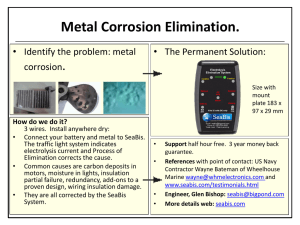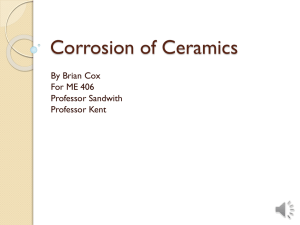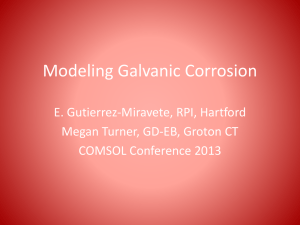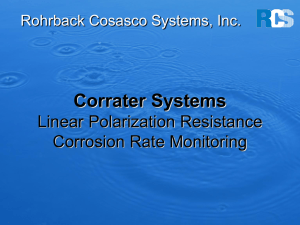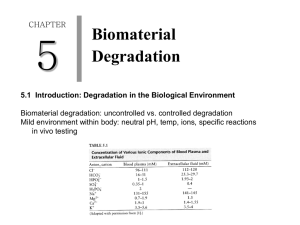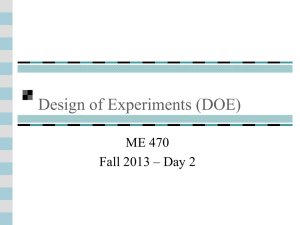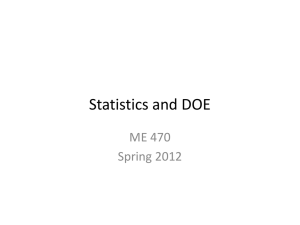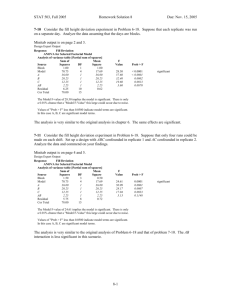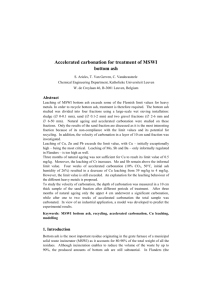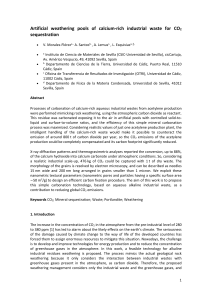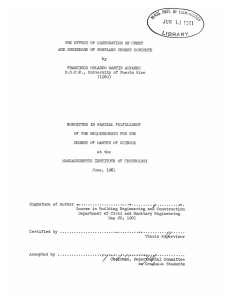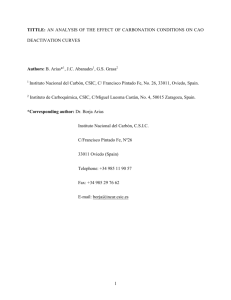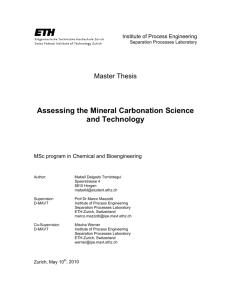presentation
advertisement
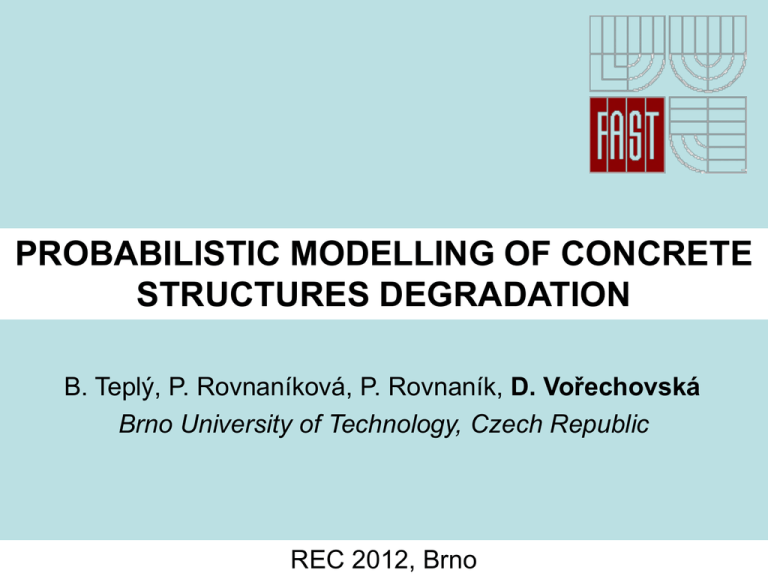
PROBABILISTIC MODELLING OF CONCRETE STRUCTURES DEGRADATION B. Teplý, P. Rovnaníková, P. Rovnaník, D. Vořechovská Brno University of Technology, Czech Republic REC 2012, Brno • Outline Degradation of RC structures …Time aspect …Codes and regulations …Durability limit states • • Software tool Evaluation of some degradation models …Carbonation m. vs. in situ measurement on cooling tower …Chloride ingress m. vs. in situ measurement on bridge in Italy …Corrosion m. vs. numerical m. • Conclusions Degradation mechanisms vs. time Degradation mechanisms vs. time carbonation and/or chloride ingress Degradation mechanisms vs. time steel depassivation carbonation and/or chloride ingress Degradation mechanisms vs. time steel depassivation carbonation and/or chloride ingress steel corrosion Codes and regulations • ISO 13832 (2008) General principles on Design of Structures for Durability • fib Model Code (2010) Bulletins 55, 56 (First complete draft) Bulletin 34 Model Code for Service Life Design (2006) • EN 206-1 (2000) Concrete – Part 1: Specification, performance, production and Conformity Durability limit states 1. Service life format t PS t D,where tPS tini t prop 1a. Simplified/initiation LS 2. Limit state format tini tD R tD S tD ULS Slim S tD SLS Durability limit states Steel depasivation (tini): Pf (tD ) P a xc t D 0 Pd Pf (tD ) P Ccr Ca t D 0 Pd Steel corrosion (tprop): Pf (tD ) Pr ra tD 0 Pd Pf (tD ) Pwcr wa tD 0 Pd Software tool FReET-D probabilistic modeling of degradation processes in time www.freet.cz (Teplý, Vořechovská, Chromá, Rovnaník – Brno University of Technology) Utilizes probabilistic platform of FReET (Vořechovský, Rusina, Novák – Brno University of Technology) Features: random input variables, MC, LHS, FORM, statistical parameters of result, sensitivity analysis, estimation of probability Pf and reliability index , automatic parametric studies, Bayess updating, number of degradation models FReET-D: implemented models No. of models Carbonation 13 Chloride ingress 1 2 Frost attack 3 Sulphate attack Acid attack 1 1 1 1 1 2 1 Reinforcement corrosion 1 1 Outputs carbonation depth, time to depassivation (concretes with Portland and blended cements) depth of chlorination, time to depassivation concentration of chlorides actual degree of saturation, relative dynamic modulus of elasticity, loosening of concrete at surface rate of concrete corrosion depth of concrete corrosion net rebar diameter (uniform cor.) pit depth (pitting cor.) net cross sectional area (pitting cor.) time to cracking (uniform cor.) crack width (uniform cor.) stress intensity factor (prestressed reinforcement, pitting corrosion, fracture mechanics approach) strength and ductility of corroded steel Evaluation of carbonation models Cooling tower (Keršner et al. 1996) • height of 206 m • in-site investigation at the age of 19.1 years • the depth of carbonation measured at 75 locations (on both the internal and external surfaces) Evaluation of carbonation models Analytical models a) fib Model Code (Bulletin No. 34) b) Papadakis et al. (1992), based on mass conservation c) Papadakis et al. (1992), R.H. function updated d) Morinaga (1992), R.H. function updated (Teplý et al. 2010) Evaluation of carbonation models Carbonation depth (19.1 years) External surface (RH = 70%) Internal surface (RH = 93%) Mean [mm] COV [%] Mean [mm] COV [%] fib Model Code 10.8 48 4.4 60 Papadakis et al. (1992) 8.2 24 1.9 43 Papadakis et al. (1992) R.H. function updated 12.7 18 8.3 51 Morinaga (1992), R.H. function updated 11.9 21 7.7 53 In situ measurements (Keršner et al. 1996) 14.9 56 8.0 29 (Vořechovská et al. 2010) Evaluation of carbonation models Carbonation depth (19.1 years) External surface (RH = 70%) Internal surface (RH = 93%) Mean [mm] COV [%] Mean [mm] COV [%] fib Model Code 10.8 48 4.4 60 Papadakis et al. (1992) 8.2 24 1.9 43 Papadakis et al. (1992) R.H. function updated 12.7 18 8.3 51 Morinaga (1992), R.H. function updated 11.9 21 7.7 53 In situ measurements (Keršner et al. 1996) 14.9 56 8.0 29 (Vořechovská et al. 2010) Evaluation of chloride ingress models Bridge in Italy Wendner, R., Strauss, A., Guggenberger, T., Bergmeister, K. and Teplý, B., 'Ansatz zur Beurteilung von chloridebelasteten Stahlbetonbauwerken mit Bewertung der Restlebensdauer', Beton- und Stahlbetonbau 12/2010 Chloride concentration measured in the different distances from the nearest surface (from 10 to 50 mm) Evaluation of chloride ingress models a) b) c) d) e) fib Model Code (Bulletin No. 34) fib Model Code; substituted surface concentration Crank´s solution of Fick´s 2nd law Thomas and Baumfort (1999) Nilsson and Carcasses (2004) and Tang and Gulikers (2007) Evaluation of corrosion model Analytical model (Li et al. 2006) vs. Numerical computation based on nonlinear FE (Vořechovská and Vořechovský 2010) Evaluation of corrosion model Analytical model (Li et al. 2006) porous zone rust steel concrete no corrosion crack filling of porous zone crack crack on initiation concrete Constant geometry: thick-wall cylinder surface, (Bažant 1979, Pantazopoulou and Papoulia 2001, Tepfers 1979) spalling Evaluation of corrosion model Numerical model ►ATENA program (Červenka Consulting) ► constitutive model based on smeared crack approach ► used fracture plastic model NLCEM ► expansion of corrosion products: (negative) shrinkage of reinforcement Evaluation of corrosion model Comparison of models Identical parameters: geometry, E, ft Extras for numerical model: GF, fc,… Conclusions • Durability design of RC structures is now actual in engineering practice • Durability/performance based approach to the specification of concrete durability may be based on predictive (proven!) models utilization • FReET-D is a software tool for fully probabilistic performance based design; the other proves of the degradation models are needed • FReET-D can be effectively utilized in combination with FReET and ATENA software
